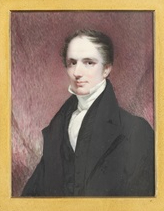Cornwallis Hewett
Cornwallis Hewett[edit | edit source]
Cornwallis Hewett (1787 – 13 August 1850) was a prominent English physician known for his contributions to medical education and his role as a physician to the royal family. His career was marked by significant achievements in the field of medicine, particularly in the areas of medical instruction and public health.
Early Life and Education[edit | edit source]
Cornwallis Hewett was born in 1787. He pursued his medical education at the prestigious University of Edinburgh, which was renowned for its medical school. During his time at Edinburgh, Hewett was influenced by the leading medical thinkers of the time, which shaped his approach to medicine and education.
Medical Career[edit | edit source]
After completing his education, Hewett began his medical practice in London. He quickly gained a reputation for his skill and dedication to patient care. His expertise led to his appointment as a physician to St George's Hospital, one of the leading hospitals in London.
Physician to the Royal Family[edit | edit source]
Hewett's reputation as a skilled physician earned him the position of Physician Extraordinary to King George IV in 1826. This prestigious role involved attending to the medical needs of the royal family, further cementing his status in the medical community.
Contributions to Medical Education[edit | edit source]
Hewett was deeply committed to the advancement of medical education. He served as a lecturer at St George's Hospital Medical School, where he was instrumental in developing the curriculum and improving the standards of medical training. His lectures were well-attended and highly regarded for their clarity and depth.
Influence on Public Health[edit | edit source]
In addition to his work in medical education, Hewett was involved in public health initiatives. He advocated for improvements in sanitation and public health measures, recognizing the impact of environmental factors on health. His efforts contributed to the early development of public health policies in England.
Later Life and Legacy[edit | edit source]
Cornwallis Hewett continued to practice medicine and contribute to medical education until his death on 13 August 1850. His legacy is remembered through his contributions to the field of medicine and his influence on future generations of physicians.
Related Pages[edit | edit source]
Search WikiMD
Ad.Tired of being Overweight? Try W8MD's physician weight loss program.
Semaglutide (Ozempic / Wegovy and Tirzepatide (Mounjaro / Zepbound) available.
Advertise on WikiMD
|
WikiMD's Wellness Encyclopedia |
| Let Food Be Thy Medicine Medicine Thy Food - Hippocrates |
Translate this page: - East Asian
中文,
日本,
한국어,
South Asian
हिन्दी,
தமிழ்,
తెలుగు,
Urdu,
ಕನ್ನಡ,
Southeast Asian
Indonesian,
Vietnamese,
Thai,
မြန်မာဘာသာ,
বাংলা
European
español,
Deutsch,
français,
Greek,
português do Brasil,
polski,
română,
русский,
Nederlands,
norsk,
svenska,
suomi,
Italian
Middle Eastern & African
عربى,
Turkish,
Persian,
Hebrew,
Afrikaans,
isiZulu,
Kiswahili,
Other
Bulgarian,
Hungarian,
Czech,
Swedish,
മലയാളം,
मराठी,
ਪੰਜਾਬੀ,
ગુજરાતી,
Portuguese,
Ukrainian
Medical Disclaimer: WikiMD is not a substitute for professional medical advice. The information on WikiMD is provided as an information resource only, may be incorrect, outdated or misleading, and is not to be used or relied on for any diagnostic or treatment purposes. Please consult your health care provider before making any healthcare decisions or for guidance about a specific medical condition. WikiMD expressly disclaims responsibility, and shall have no liability, for any damages, loss, injury, or liability whatsoever suffered as a result of your reliance on the information contained in this site. By visiting this site you agree to the foregoing terms and conditions, which may from time to time be changed or supplemented by WikiMD. If you do not agree to the foregoing terms and conditions, you should not enter or use this site. See full disclaimer.
Credits:Most images are courtesy of Wikimedia commons, and templates, categories Wikipedia, licensed under CC BY SA or similar.
Contributors: Prab R. Tumpati, MD

